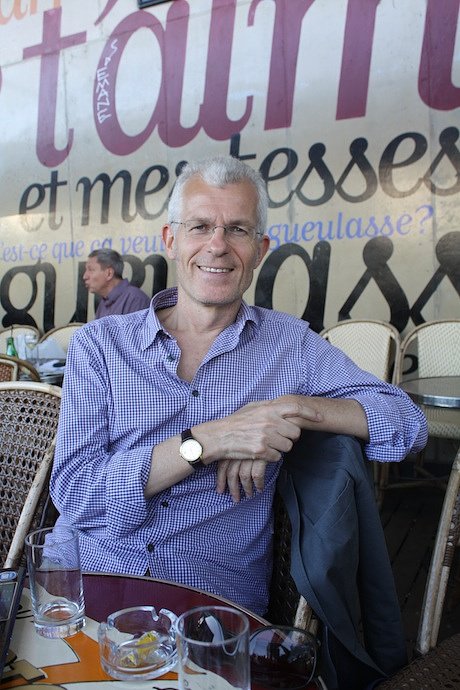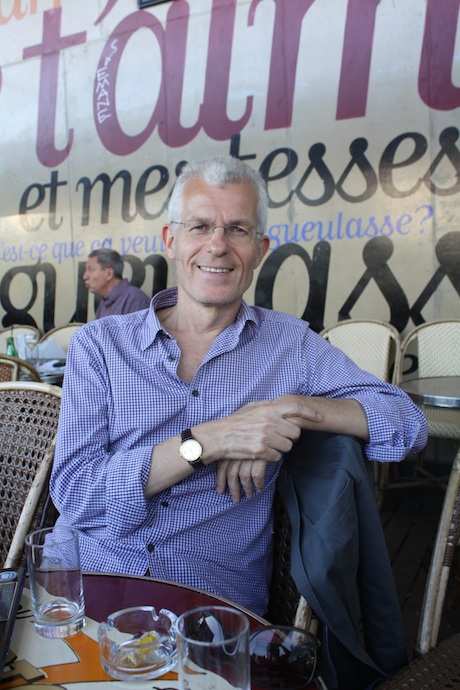The Ultimate Coming-to-Paris Book: An Interview with Author Stephen Clarke

Mon 23 Jul 2012

Stephen Clarke.
Meet Paul West, the hero among heroes in books about Paris. At first a naive foreigner who lands in Paris with imperfect French and British ideals, gets cut while waiting in line, is snapped at by Parisian waitstaff and is ensnared by dog merde on the street, he eventually discovers how to fit in with—and occasionally one-up—his French neighbors.
Or rather, meet his maker. The Paul West novels came to life 10 years after their creator, Stephen Clarke, first moved to Paris. After a decade of settling in, Clarke was able to look back on those early years with amusement and compose A Year in the Merde. While Clarke’s background is in publishing and teaching English abroad, he became familiar enough with French office life, cafés and some eccentric Parisians to compose the humorous and very realistic fiction of an ambitious young Brit who moves to Paris to (attempt to) open an English tearoom but repeatedly faces cultural barriers, confusing lovers, linguistic blunders, hypocrisy and corruption.
Seated across from me at the cozy MK2 Café, Clarke reminisces, “In the books, Paul West goes through all the bureaucratic hassle, but I only started to write about it once I’d been through it and I could step back and find it funny. When you’re doing it, it’s not funny. When you’ve done it all, and you look back on it, you can see the funny side.” Now an evolved Parisian, the 53-year-old writer casually leans back in his chair at our canalside café and tells me confidently, “Paris is just such a comfortable place to live.”
Through the fictional “Merde” series and his later nonfiction books about Paris—from Talk to the Snail, a collection of commandments for understanding the French language and culture (“Thou shalt be wrong—if you’re not French”); to 1,000 Years of Annoying the French, an account of the past millennium of history and rivalry between the French and the English; to, most recently, Paris Revealed, a unique guidebook of the city—Clarke dispenses invaluable Paris tips to save you from getting into sticky situations like the physical and metaphorical merde that Paul constantly slips in.
You can, for example, find more in Paris than just lines of tripists by visiting the lesser-known gems highlighted in Paris Revealed, such as the World War II bullet holes still visible in the facade of the Hôtel le Meurice, remains of the city’s first railway in the Parc des Buttes Chaumont and the old fountain near Bastille still spouting the drinkable water that helped ease Parisians’ dependency on the disease-ridden waters of the Seine. You can also pick up tips on how to act and think like a Parisian, from grabbing one of the many lounge chairs at Paris Plage (the sand-filled banks of the Seine in summertime) to picking up on the pretentiousness of the inner-city dwellers. Describing the commute of suburbanites to work via the metro-like RER, Clarke writes, “Parisians are inherently snobbish, and regard this system as a kind of slave ship transporting unfortunate chained-up workers away from their suburban homes and into the clutches of their cruel masters.”
While the author prepares you for the meanest and most negligent customer service in the world, you shouldn’t let the books scare you away from booking your plane ticket. Just take his instructions with a grain of salt and recognize that the humorous storytelling angle has hyperbolized the Parisian attitude for your reading amusement. A bit scarred from reading about the city’s stubborn, snobbish or predatory inhabitants, I was abashed to be greeted by Parisians speaking slowly and sweetly to me once they discovered I was a French-impaired foreigner. As Clarke himself recognizes in Paris Revealed, “In fact, most Parisian waiters are very polite, much to the annoyance of visitors hoping to go home with anecdotes about grumpy service.”
In writing publicly about his struggles and creating cultural commandments, some people may complain that he generalizes and caricatures an entire population. “I’m just saying this is just how it is. So . . . when people get annoyed with me and send emails, I say to them, ‘I’m really sorry, but the thing you’re getting offended about actually happened to me, and I’m not the only one.’ . . . People go on about how terrible it is the way I write about French collaborators during World War II . . . and I’m only saying what happened. . . . The truth sometimes hurts.”
In molding his own bittersweet experiences, and some inventive climaxes, into these comical and highly instructional Paris books, Clarke helps ease the pain of potential visitors, mend the wounds of worn residents and even give a vindictive pleasure to Parisians themselves, making himself and his character Paul the heroes of their audience. To this claim, the author corrected me, insisting, “He’s more of a victim.”
For Paul West’s next adventure, look out for The Merde Factor, coming out in September. For a synopsis of all of Clarke’s books in his own dry voice, visit his website.
Related Link
Stephen Clarke
Struck with wanderlust at an early age, Tori Evans studied in Australia to try to get as close to as many deadly things as possible, then moved to Alaska to see how often she could get lost in the wilderness, and then to Egypt to get caught in a revolution. Now a resident of Paris and bound in the mysterious PACS (Pacte civil de solidarité) with the Frenchman she picked up in Cairo, she is set on exploring the thrills of the City of Light. Check out her three years of culture shock, scuba diving and horseback—and donkeyback—desert riding in Egypt at www.torievans.blogspot.fr and at her new French blog.
Editor’s note: Are you a GG2P fan on Facebook? Join us each week for photo Tuesday, foodie Wednesday, fashion Friday and a lot of girl talk in between. And you’ll have first dibs at special events and giveaways.